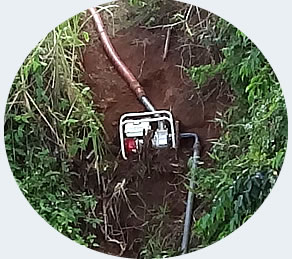Agricultural water testing evaluates water quality, to improve management and usage patterns when it comes to irrigation.
Farming water testing is an important component of overall soil-care and fertility management.
It helps identify the presence and concentration of various chemical elements so as to determine the effect that your irrigation water has on your soil and ultimately, on your crops particularly in view of expected chemical interactions with the fertlizers already in use on the ground.

The physical and chemical properties of farm water have a substantial impact on the quality of your crop and the health /safety of your workers and animals
Testing of farm water helps with early detection of the cumulative effect of certail chemical elements present in the water that may affect soil fertility, animal health, workers’ welfare, interaction with chemical fertilizers as well as the longevity of physical assets such as pumps and piping. Parameters tested for include acidity (PH), toxicity – the presence of potentially harmful elements which risk accumulating to poisonous levels over time such as arsenic or chloride and electrical conductivity (determined by the presence of dissolved salts in the water). Other salts such as sodium and potassium cause salinity in water, reducing the overall viablity of soil for crop husbandry over time.
